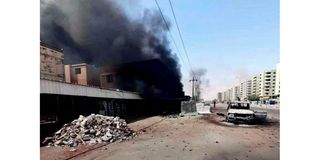Women leaders amplify voices against Sudan conflict

Smoke rises from a building next to a damaged car on a street in Khartoum, Sudan. A section of African women leaders has stood in solidarity with women and girls in Sudan in the wake of the ongoing civil war.
What you need to know:
- The leaders deliberated on strategies during a virtual meeting convened by Ms Bineta Diop, the AU Special Envoy for Women Peace and Security.
- They highlighted the impact of the conflict on women and girls and vowed to source support for peacebuilding.
A section of African women leaders has stood in solidarity with women and girls in Sudan in the wake of the ongoing civil war.
Through the African Union Special Envoy for Women, Peace, and Security; UN Women; and the African Women Leaders Network, they are supporting calls to end the conflict. The leaders deliberated on strategies during a virtual meeting convened by Ms Bineta Diop, the AU Special Envoy for Women Peace and Security.
They highlighted the impact of the conflict on women and girls and vowed to source support for peacebuilding. The leaders argued that with women and girls facing severe and disproportionate impacts of the crisis, their involvement in response and meditation efforts will be crucial to ensuring gender-equal aid and building lasting peace. They included former Liberian President Ellen Johnson Sirleaf, former UN Women Executive Director Phumzile Mlambo-Ngcuka and Kenya’s former Foreign Affairs Cabinet Secretary Raychelle Omamo.
Despite several attempts to reach a ceasefire, fighting continues in Khartoum, Darfur and other parts of Sudan. Shortages of food, water, medicine, electricity and fuel are becoming extremely acute, especially in Khartoum and surrounding areas.
The leaders noted that in a country where around four million children, and pregnant and lactating women were already severely malnourished, food shortages, coupled with temporary suspension of humanitarian aid, have heightened consequences for women and girls, who have been disproportionately dependent on international assistance.
Reports of gender-based violence are surfacing, with access to prevention and response services severely limited in Khartoum and across the country following destruction and looting of healthcare facilities. Of 700,000 people internally displaced and about 200,000 who have fled to neighbouring countries, women, girls, the elderly, and other vulnerable populations are the majority.
Opening the virtual meeting, Mr Alex Ratebaye Tordeta, Deputy Chief of Staff of the African Union Commission (AUC), said they will intensify advocacy efforts for the political and peace process in Sudan. “It is important to take into account women’s needs and to protect them from gender-based violence. The AUC is with you and will work hand in hand with you to end the suffering of our sisters in Sudan,” said Mr Tordeta.
Ms Sirleaf, in a keynote address, said Sudanese women have shown that there is no time to be disheartened and despondent. “The women in Sudan have shown clear sightedness about what needs to be done and what actions need to be taken both within Sudan and outside its borders. We must continue to show the same unity and demonstrate a resolve to help end the conflict and put the country back on the path to peace and security – back to civilian rule,” she said.
Sustainable peace
Ms Omamo termed it essential for African women leaders to stand in solidarity with Sudanese women and girls by demanding cessation of hostilities and active inclusion and protection of women in sustainable peace efforts.
Ms Mlambo-Ngcuka expressed concern about the situation. “We know the women did so much to bring about change in the country, but it continues to be elusive. The lack of attention and under-representation of women continues to be an issue that we are pushing to resolve,” she said.
Ms Zebib Kavuma, the deputy regional director, UN Women Eastern and Southern Africa, said her organisation supports the brave and strong Sudanese women and girls. “I commend the young women uniting for peace and responding to the crisis through social media and digital technologies, creating an IT application that provides safe routes guidance and mapping locations with food, water, and medicines.”
Ms Lina Marwan, a feminist and human rights lawyer and a member of the Peace for Sudan Platform, highlighted initiatives started so far, from social media campaigns within Sudan and the diaspora advocating peace, to frontline humanitarian responses by women’s organisations providing shelter, food and medical assistance to those fleeing the conflict.
Ms Samar Abushama, a young peace-builder and gender equality advocate, shared immediate and intermediate proposals to increase support. The proposals included humanitarian assistance for refugees hosted in neighbouring countries, counselling and psychological support for women victims of violence, and the opening of safe passages for humanitarian aid.
They also entailed prioritising women’s participation in humanitarian response, peacebuilding efforts, and decision-making regarding the future of Sudan. According to the World Health Organization, more than 400 people have died since the conflict broke out on April 15.
The United Nations Children's Fund has said children are paying a high price, with at least nine reportedly killed in the fight and more than 50 badly injured.
UN Secretary-General Antonio Guterres last week also called for an immediate halt to the conflict. Mr Guterres said the ceasefire will allow the civilians trapped in conflict zones to seek medical treatment, food and other essential supplies. “This must be the first step to providing respite from the fighting and paving the way for a permanent ceasefire,” he told reporters at the UN headquarters in New York.





